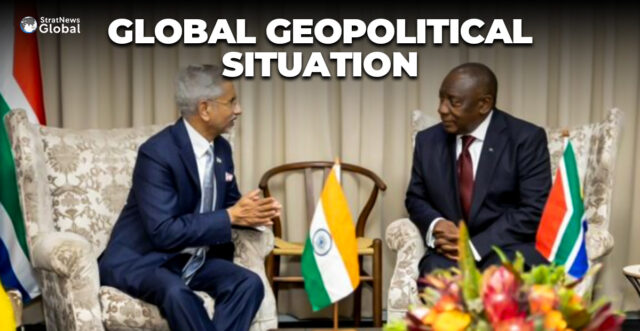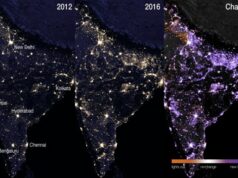External Affairs Minister S. Jaishankar flagged difficult global geopolitical situation and deeply damaged multilaterlism, at the first foreign ministers meeting under South Africa’s G 20 Presidency, in Johannesburg.
He said that the ability of G 20 to harmonize viewpoints is key to advancing the global agenda.
“The global geo-political situation remains difficult by any definition. Some of it is the accumulated challenges of the Covid pandemic, conflict situations, financial pressures, food security and climate concerns. But there is also the current anxieties about concentrated supply chains, weaponization of trade and finance, and transparency of data flows. Looking ahead, differential progress on AI and EV, space, drones or green hydrogen have clear geo-political implications. As we think through them all, pressing concerns also need urgent resolution,” Jaishankar said.
He said that geo-politics is a reality, as is national interest.
“But the very purpose of diplomacy – and a group like G-20 – is to find common ground and create the basis for collaboration. We can do so best by observing international law, respecting the UN Charter and preserving institutions. Differences must not become disputes, disputes should not become conflicts, and conflicts should not lead to a bigger breakdown. There are lessons from the last few years for all of us to reflect on.”
The External Affairs Minister who is also a career diplomat, said, “We also must recognize that multilateralism itself lies deeply damaged. The UN and its Security Council is often grid-locked. Just getting it back to work is not enough; its working methods and representation must change. More plurilateralism is required to plug global deficits.”
Jaishankar added, “International cooperation itself must be less opaque or unilateral. And the global agenda cannot be narrowed down to the interests of a few.”
The South African President Cyril Ramaphosa attended the opening session of the first Foreign Ministers Meeting which took place under South Africa’s G20 Presidency.
The theme of the meeting is ‘Solidarity, Equality and Sustainability.’
In his address, the South African President said that geopolitical tensions, rising intolerance, conflict and war, and climate change, pandemics and energy and food insecurity threaten an already fragile global coexistence.
He said that these challenges are inter connected and require responses that are inclusive and coordinated.
Ramaphosa voiced concern over there “lack of consensus among major powers, including in the G20, on how to respond to these issues of global significance.
He reminded foreign ministers of G 20 countries to find common ground through constructive engagement.
” As a premier forum for international economic cooperation, the G20 needs to play a leading role in the global agenda for people, planet and prosperity.”
The South African President said that it is important that the G 20 leaders summit later this year will be convened for the first time on African soil.
“The Summit’s location underscores the need for African voices to be heard on critical global issues, like sustainable development, the digital economy and the shift towards green energy.”
He reminded the G 20 members that the deadline for achieving the Sustainable Development Goals, is just five years away.
“The G 20 represents over two-thirds of the world’s population. We would like our G 20 Presidency to be one in which all voices are heard and in which all views count. As the G 20, it is critical that the principles of the UN Charter, multilateralism and international law remain at the centre of all our endeavours.”
Ramaphosa said that climate change is now a catastrophic reality.
He enumerated four priorities that South Africa has identified for its G 20 Presidency.
These include action to strengthen disaster resilience and response and action to ensure debt sustainability for low-income countries.
Jaishankar assured Ramaphosa of India’s support to priorities of South Africa’s G 20 Presidency.
He said, “G20 is an important expression of the world’s growing multi-polarity. However, the polarization of recent years has created visible stress and distorted priorities. What we could do was, to somehow, find enough common ground to safeguard this institution. Today, the imperative is to go beyond that.”
The External Affairs Minister articulated India’s position on issues of pressing concern.
“On the Middle East, we welcome the Gaza ceasefire and hostage release, support humanitarian assistance, condemn terrorism, and advocate a two-state solution. Maintaining the ceasefire in Lebanon and ensuring an inclusive Syrian-led, Syrian-owned solution are important. Peace and stability in the region is vital for the entire world,” he said.
“Ensuring maritime security in and around this region is also essential. Indian naval forces have contributed to that in the Arabian Sea and Gulf of Aden. Restoring normal maritime commerce remains a priority.”
Jaishankar also put out posts and pictures of his meeting with several foreign ministers including the Chinese Foreign Minister, Wang Yi and the Russian Foreign Minister, Sergey Lavrov, on the sidelines of the meeting in Johannesburg.
The External Affairs Minister said that he discussed Ukrainian developments with his Russian counterpart.
“Glad to meet FM Sergey Lavrov of Russia this evening in Johannesburg. Reviewed the continued progress of India-Russia bilateral cooperation. Discussed recent developments pertaining to the Ukraine conflict, including his Riyadh meeting. Agreed to remain in touch,” the post read.
In his speech, Jaishankar said, “Regarding the Ukraine conflict, we have long advocated dialogue and diplomacy. Today, the world expects that parties concerned deal with each other to end the war.”
He said that other conflicts such as DRC, Sudan and Sahel do not get the attention they deserve. “This must change.”
“In the Indo-Pacific, it is important that international law – especially UNCLOS 1982 – is respected. Agreements entered into must be observed. And there must be no room for coercion,” he added.
Delhi based journalist pickled in journalism. Have reported from nine world capitals and almost all parts of India. Over the last three decades, I have worked for India’s mainstream English dailies and contributed to All India Radio, Doordarshan and Women’s Feature Service. Also worked for international media including Japan’s leading newspaper, The Asahi Shimbun and done assignments for The Sunday Times, London, The Telegraph, The Guardian and the Canadian Broadcasting Corporation. Worked in the Embassy of France in New Delhi and can speak French to save my life. Write on Diplomacy, Politics and the social sector. Love Nature, heritage, Nature, animals and vintage cars. Enjoy cycling and playing badminton.





